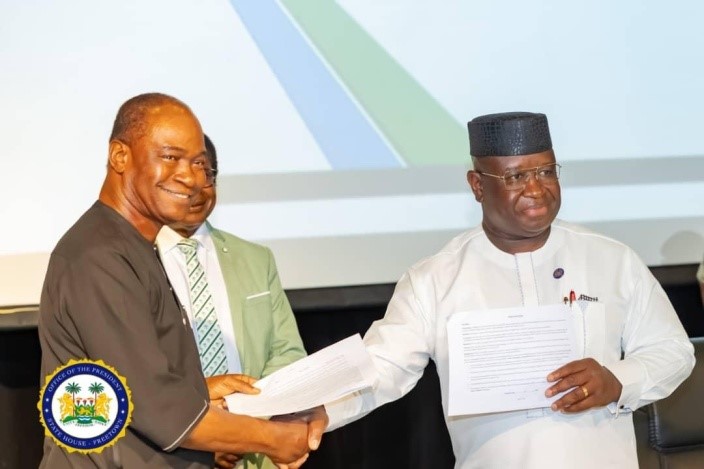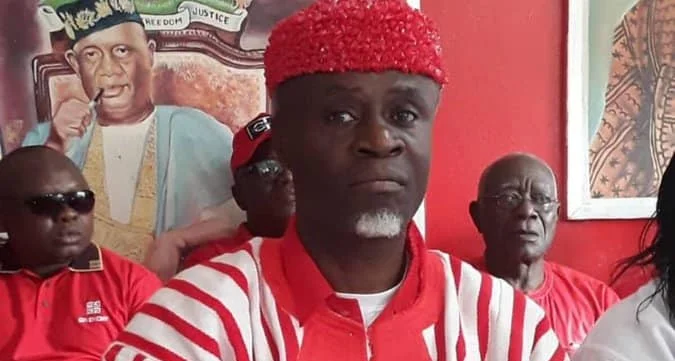By Mackie M. Jalloh
In a move aimed at defusing the escalating political tensions in Sierra Leone, Dr. Samura Kamara, the leader of the All Peoples Congress (APC) and its presidential candidate in the controversial 2023 general elections, has called for a face-to-face meeting with President Julius Maada Bio. The proposal underscores Dr. Kamara’s commitment to finding a peaceful resolution to the country’s growing unrest, as the fallout from the disputed elections continues to strain the political fabric of the nation.
Speaking in a recent interview with Voice of America (VOA), Dr. Kamara emphasized the urgency of this meeting, which he hopes will set the stage for a broader discussion on critical national issues. Among the top priorities for the APC leader is the comprehensive implementation of the national unity agreement, a framework designed to bridge the widening divide between the ruling Sierra Leone People’s Party (SLPP) and the opposition. Additionally, Dr. Kamara intends to push for the finalization of recommendations from the Tripartite Committee on electoral reforms—a body that has been central to ongoing debates about the integrity of the electoral process in Sierra Leone.
One of the most contentious topics likely to dominate the discussions is the Electoral Commission for Sierra Leone’s (ECSL) refusal to release the disaggregated data from the 2023 general elections. This data, which details voting patterns and results at a granular level, has been the subject of intense scrutiny and demands for transparency from both domestic and international observers. Dr. Kamara has been a vocal critic of the ECSL’s handling of the election results, arguing that the commission’s reluctance to share this data fuels suspicion and undermines the credibility of the entire electoral process.
The planned deployment of an ECOWAS standby force in Sierra Leone is another critical issue on Dr. Kamara’s agenda. The potential introduction of foreign troops into the country, ostensibly to maintain peace and stability, has been met with mixed reactions. While some see it as a necessary step to prevent further escalation of violence, others, particularly within the APC, view it as an infringement on national sovereignty and a sign of the international community’s lack of confidence in Sierra Leone’s ability to manage its internal affairs.
However, Dr. Kamara’s call for dialogue has not been without controversy within his own party. The APC’s National Publicity Secretary, Sidi Yayah Tunis, confirmed that the proposed meeting between Dr. Kamara and President Bio is in the works, but he also revealed that it has sparked a significant internal debate. According to Tunis, while there is broad support within the party for engaging in dialogue with the ruling government, there is considerable concern about the private nature of these talks. Many within the APC’s national executive believe that any discussions between the two leaders should be conducted openly, with the involvement of other senior party members, to ensure transparency and accountability.
This is not the first time that Dr. Kamara and President Bio have met since the contentious 2023 elections, but the outcomes of their previous engagements remain largely unknown, even within the upper echelons of the APC. This lack of transparency has only deepened the rift within the party, as some members feel increasingly sidelined from the decision-making process. Tunis’s disclosure has further fueled calls within the APC for greater openness in any future talks, reflecting the broader demand for transparency that has characterized much of the post-election discourse in Sierra Leone.
As the country grapples with the fallout from one of its most contentious elections in recent history, the proposed meeting between Dr. Kamara and President Bio could represent a pivotal moment in Sierra Leone’s political landscape. Whether it leads to meaningful progress in addressing the nation’s deep-seated political divisions or further exacerbates the tensions remains to be seen. What is clear, however, is that the stakes are high, not just for the two leaders, but for the future of Sierra Leone itself.













